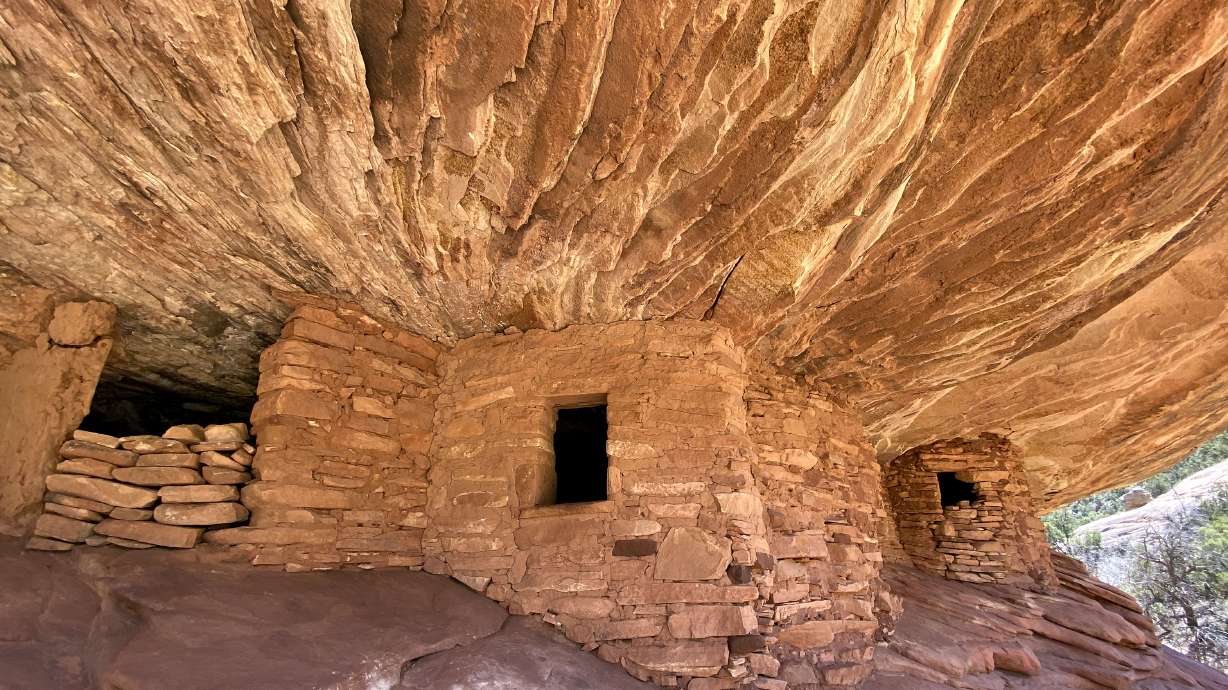Estimated read time: 4-5 minutes
This archived news story is available only for your personal, non-commercial use. Information in the story may be outdated or superseded by additional information. Reading or replaying the story in its archived form does not constitute a republication of the story.
SALT LAKE CITY — A federal judge has dismissed Utah's lawsuit over President Joe Biden's decision to reinstate the size of Bears Ears and Grand Staircase-Escalante national monuments in southeast Utah, determining that Biden's judgment "is not an action reviewable by a district court."
U.S. District Judge David Nuffer sided with the federal government and four Native American tribes, who had petitioned for the lawsuit to be dropped, in a 28-page ruling handed down Friday.
"In spite of the sincere and deeply held view of the plaintiffs, there is no relief for them in this action," Nuffer concluded. "President Biden's judgment in drafting and issuing the proclamations as he sees fit is not an action reviewable by a district court."
The Utah Attorney General's Office issued a statement Friday that it "respectfully but strongly disagrees" with the ruling and plans to appeal the decision. Utah Gov. Spencer Cox added that he believes that he believes the case will ultimately end up in the U.S. Supreme Court and that Friday's ruling "helps us get there even sooner."
"Monument designations over a million acres are clearly outside that authority and end up ignoring local concerns and damaging the very resources we want to protect," he said. "We look forward to starting the appeals process immediately and will continue fighting this type of glaring misuse of the Antiquities Act."
Utah leaders, as well as Kane and Garfield counties, filed the lawsuit against the federal government in federal court in August 2022, arguing that Biden's order was "an abuse of the president's authority under the Monuments and Antiquities Act."
Biden issued an executive order in 2021 that reestablished the sizes of both Grand Staircase-Escalante and Bears Ears national monuments. The two monuments were designated by President Bill Clinton in 1996 and President Barack Obama in 2016, respectively.
The order came nearly four years after President Donald Trump issued a declaration that shrank the sizes of the monuments, from a combined total of nearly 3.25 million acres to a total of a little more than 1.2 million acres.
"These public lands and sacred sites are a stewardship that none of us take lightly," a group of Utah leaders wrote in a statement at the time. "The archeological, paleontological, religious, recreational, and geologic values need to be harmonized and protected. Rather than guarding those resources, President Biden's unlawful designations place them all at greater risk."
The Hopi, Navajo, Pueblo of Zuni and Ute Mountain Ute tribes joined the lawsuit as intervening defendants after the initial lawsuit was filed, as did several conservation groups. The federal defendants and Tribal Nations then petitioned for the lawsuit to be dismissed in March, arguing that "binding precedent" has held the Antiquities Act up "for decades."
In the end, Nuffer agreed.
In his ruling, he writes Congress authorized that the U.S. president can, "in the president's discretion," establish or enlarge a national monument "confined to the smallest area compatible with the proper care and management of the objects to be protected," through the 1906 Antiquities Act. He adds that there have been numerous challenges to these rulings over the past century that have been unsuccessful.
He also referenced a 1940 Supreme Court ruling in his decision. There, the court determined that "it has long been held" that Congress can authorize "a public officer to take some specified legislative action when in his judgment that action is necessary or appropriate to carry out the policy of Congress."
Because of this, he determined that there is no action he could take in Utah's lawsuit.
It's unclear when the Utah Attorney General's Office will file its appeal, but the statement says that it will "in order to stand up against President Biden's egregious abuse of the Antiquities Act."
Meanwhile, conservation groups are celebrating the ruling. Aaron Weiss, the deputy director for the Center for Western Priorities, called the decision "yet another victory for the Antiquities Act and America's public lands."
"The president and Congress both know that national monuments are popular and vital to America's future," he said. "That's why the Antiquities Act is still important today, more than a century after Teddy Roosevelt first used it. It's time for Utah politicians to stop wasting millions of taxpayer dollars on pointless lawsuits that they know will keep getting dismissed."
Contributing: Jessica Lowell









